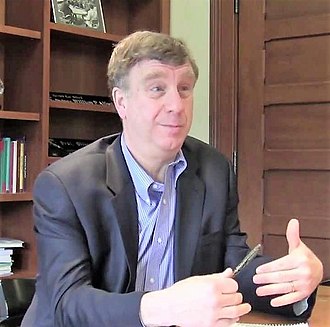William P. Alford

William P. Alford (Chinese name: 安守廉; An Shoulian) (born 1948) is a United States legal scholar. He is currently Henry L. Stimson Professor of Law and Vice Dean for the Graduate Program and International Legal Studies at Harvard Law School (Massachusetts, USA). He is Director of East Asian Legal Studies at Harvard Law, and is regarded as an expert in the field of Chinese law.
He is an honorary professor of Renmin University, Zhejiang University and the China National School of Administration, and an Honorary Fellow of the American Studies Institute of the Department of Law of the Chinese Academy of Social Sciences. He directed the China Center for American Law Study, the first academic program in U.S. law in the PRC, was a founder in 1982 of the U.S. Committee on Legal Education Exchange with China, is the recipient of a number of awards and fellowships for his work on China, and is on a host of advisory and editorial boards.
William Alford was born in Massachusetts to the physician Dr. Hyman Alford and Rose Alford. He has a sister, Nancy Ruth Alford Wine, a corporate banker.
Alford received his B.A. degree from Amherst College in 1970, LL.B degree from the University of Cambridge in 1972. He received M.A.s in Chinese Studies and Chinese History from Yale University in 1974 and 1975, respectively, and a J.D from Harvard Law School in 1977.
Alford was a law professor at UCLA before taking a position at Harvard Law School.
He has been involved for decades in China's legal reform. Almost 25 years ago, with Professor Randle Edwards, then of Columbia, he founded the first academic program in the PRC on American law and the first national exchange program to bring Chinese students to the U.S. for legal education—including many who are in the forefront of legal change in China today. In the years since, he has been called on by both the US government and China's—as well as multilateral organizations, foundations, civic groups and NGOs, law firms and businesses—to offer advice on a range of issues from trade to human rights to intellectual property to the legal profession and legal education and beyond. In recent years, he has focused on the pro bono work with the Special Olympics in issues of disability in China.